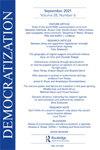Political polarization in Korea
IF 2.9
1区 社会学
Q1 POLITICAL SCIENCE
引用次数: 1
Abstract
ABSTRACT This article provides an empirical overview of political polarization in Korea from 2004 to 2021 based on a wealth of longitudinal surveys. We consider elite as well as mass polarization, document the extent of ideological polarization in terms of standard left-right measures, and consider more specific forms of polarization, including affective polarization and the specific issues that are proving divisive. We find that polarization in the country has increased over time, but not among the electorate as a whole. Rather partisan identifiers and party activists of the two main parties have shown a movement towards the extremes in terms of ideology, issue positions, and aversion towards the other party. For both legislators and the voting public, the substantive scope of political polarization is widening, encompassing not only foreign policy but also economic issues that had not seen strong signs of partisan divergence in the past.韩国的政治两极化
摘要本文基于大量纵向调查,对2004年至2021年韩国政治两极分化进行了实证综述。我们考虑精英和大众两极分化,用标准的左右衡量标准来记录意识形态两极分化的程度,并考虑更具体的两极分化形式,包括情感两极分化和被证明是分裂的具体问题。我们发现,随着时间的推移,该国的两极分化有所加剧,但在整个选民中却没有。相反,两个主要政党的党派识别者和政党活动家在意识形态、问题立场和对另一方的厌恶方面表现出了走向极端的运动。对于立法者和投票公众来说,政治两极分化的实质性范围正在扩大,不仅包括外交政策,还包括过去没有出现强烈党派分歧迹象的经济问题。
本文章由计算机程序翻译,如有差异,请以英文原文为准。
求助全文
约1分钟内获得全文
求助全文
来源期刊

Democratization
POLITICAL SCIENCE-
CiteScore
6.40
自引率
12.50%
发文量
73
期刊介绍:
Democratization aims to promote a better understanding of democratization - defined as the way democratic norms, institutions and practices evolve and are disseminated both within and across national and cultural boundaries. While the focus is on democratization viewed as a process, the journal also builds on the enduring interest in democracy itself and its analysis. The emphasis is contemporary and the approach comparative, with the publication of scholarly contributions about those areas where democratization is currently attracting considerable attention world-wide.
 求助内容:
求助内容: 应助结果提醒方式:
应助结果提醒方式:


